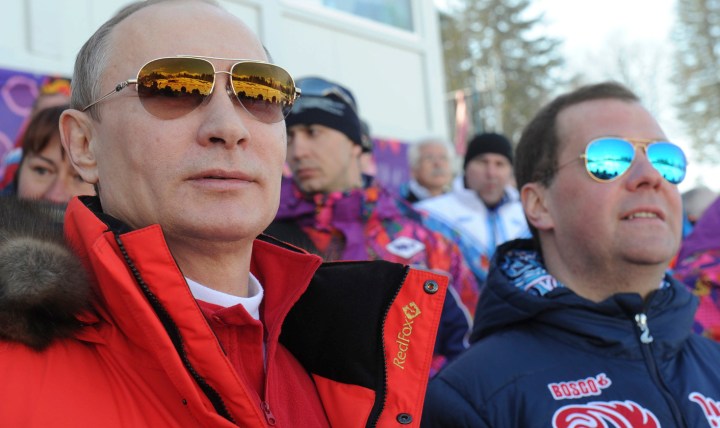Sport
The real Olympic fever

The current Winter Olympics in Sochi, Russia, has encouraged J. BROOKS SPECTOR to contemplate the larger meaning of the Olympics. From an effort to transfer aggression from the battlefield and on into healthy competition in athletic events, the Olympics are now a gigantic exercise in national prestige, aggrandisement and national infrastructure building.
Many friends may not know it but as unlikely as it sounds, this writer has skied down one of those great courses built for the Olympics. Really. Living in Sapporo, Japan, about ten years after that city had hosted the 1972 winter games, I was challenged to learn to ski. Everybody else in Sapporo did. Since I didn’t, yet, I was a curiosity. Japanese friends were given to asking if I was under a doctor’s care for some secret aliment. Why else would one not want to ski in a place as well suited for winter sports as Sapporo was?
Becoming as brave as I could under the circumstances, and together with another American skiing neophyte to stiffen my resolve, I went to a popular ski resort, the Teine Highlands, just a short distance from the downtown part of Sapporo to begin my confrontation with fear.
Our instructor was a young Japanese woman who had taught skiing around the world (and who showed little mercy for my brand of fear) and the entire facility was directed by the man who had so famously skied down Mt Everest (as well as the highest mountain on every other continent) and he encouraged her to be tough, to make us bear down hard at this task. This resort had been the actual location for all the big downhill events in the 1972 Olympics and then, after that circus ended, Teine was converted into a hugely popular resort for winter sports.
I was not, obviously, Olympic class as a skier – even after some arduous training. But soon enough, we were being pushed to tackle the men’s giant slalom course after several weeks of practice. “No more bunny slopes” was our mantra. From the bottom of the ski slope, the course looked daunting, but not impossible. From the top, however, it looked like a sheer 90-degree drop into an apocalyptic abyss.
However terrifying in its angle of descent, the correct response could only be: “Can’t be a coward, the honor of America is at stake. Have to go for it.” And so, down we went, finally reaching the bottom after an eternity of anguished angling downward, pausing to recover our equanimity, still the panic, and then start our descent yet again. By the time I reached the end of the course and the club house was in reach, it felt like I had spent an eternity on that slope.
And despite the constant snow and subarctic chill in the air, my ski outfit had become soaked through out of fear – and trembling. A record was set I am told — the slowest time ever recorded in this Olympic event. But, I have a picture of us, perched at the edge of that slope, ready to meet our maker.??This experience – modest though it may have been in the grander scheme of things – helped me understand a bit as to why cities (and nations and their leaders) vie for the opportunity to serve as the host for an Olympics, this despite the fact these games have become outrageously expensive to support in the manner expected by the IOC. (Of course FIFA is even more avaricious in its demands on a host nation – as South Africa recently learned to its financial embarrassment and as Brazil may be coming to understand).
A host city looks to such games to give a sense of community purpose, to build essential infrastructure to make it “world class”, and to help make it a place that can take (or regain) its rightful position in the world. And sometimes, sponsors and proponents hope for a bit more as well. Sapporo, for example, managed to get a whole set of first class sports venues for winter sports, a real boost to its international snow festival (with its great snow sculptures throughout the downtown), a modern subway system and some other modern conveniences, and a place on the world map as one of Japan’s most modern and livable, medium-sized metropolitan areas.
But it didn’t attract a great deal of new investment for its major industries – but that may have been because most of its industries (extractive ones like pulp and paper) were already being overtaken by other more fortuitously placed (with cheaper costs of doing business) cities around the world. Or, perhaps, it was because Sapporo was just too far away from Tokyo and the rest of the country’s business heartland. But if the economic afterglow was relatively feeble, the citizens of that city had their memories and the pride that comes from having pulled off one of those really big, world-class events — and the uniqueness of being the only city on earth where a dozen ski lifts are directly accessible by the city’s municipal bus system.
Thinking back to Sapporo also takes us to the now-on-going Winter Olympics in Sochi, Russia, an event on its own dedicated television channel and breathless reporting throughout the world’s media. So far at least, there is much athletic drama on screen, including the pain of competitors who just miss a bronze medal by a handful of milliseconds, the inevitable victories of the Dutch speed skaters, the impossible acrobatics of the snow skateboarders, and the emergence of some new figure skating heroic superstars in the making,
But, so far, at least, these games lack anything that aspires to match struggles like the larger-than-life Olympic clashes of American and Soviet teams in gold medal basketball games, or ice hockey matches. These had taken on the mantle of the entire Cold War or other geopolitical struggles, when it all came down to a final basket on the court or a desperation slap shot on the ice.
Watch: The final minute of the USSR vs USA 1980 ice hockey match
Or the David versus Goliath-like feeling of a Soviet Union attempting to hammer down a Hungarian, Czech or Yugoslav team in the midst of Soviet efforts to enforce its writ throughout Eastern Europe. Or the boycotts – threatened or real – over South African participation during the Apartheid era – or because a country like New Zealand had decided to play South Africa in another sport not in the Olympics. Or those two reciprocal boycotts by the US and its allies and then the Soviet Union and its satellites of the 1980 Moscow and then 1984 Los Angeles games. (And the consequent American lionising of Romanian gymnast Nadia Comaneci and the others, when their team had come to LA anyway in spite of Soviet dictates.) Or, of course, the disaster in Munich when Israeli athletes were slaughtered right inside the athletes’ village.
But perhaps the granddaddy of all those bigger-than-the-games, portending some larger metaphysical meaning about world events, were the Berlin Olympic Games of 1936. These were set up as Adolph Hitler’s moment to demonstrate the inevitable athletic superiority of Germany’s “Aryan race”, Hitler had even commissioned film maker Leni Riefenstahl to create a paean of praise to this inevitability in her film, Olympia. But African American athlete Jesse Owens systematically overwhelmed all his competition – turning athletic events into metaphors for the coming world conflagration and the struggle against a racial apocalypse.
Watch: ADOLF HITLER – Opening Berlin 1936 Olympic Games.
So far at least, this year’s competitions seem to lack any of these overwhelming metaphors or efforts to reach for deeper metaphysical meaning. Nonetheless, there is a deeper story for the Sochi Games. This concerns the way Vladimir Putin had worked so hard to bring the games to the isolated, economically backward region of southern Russia – and an area close to Russia’s most persistent region of rebellion and terrorism – Chechnya.
Why has this happened? As Christian Caryl, writing in The New York Review of Books this week has noted, “The answer is not as complicated as it may seem. Vladimir Putin comes from St. Petersburg. He rules from Moscow. But it is the North Caucasus that launched him on his path to the summit of Russian power. Anyone who wants to understand the many controversies now roiling around Sochi must start with this fundamental political fact. Russia launched its Olympic bid in 2006, a moment when Putin was basking in his hard-won status as the leader who had finally vanquished the long-running rebellion in Chechnya. Putin did not choose Sochi by chance. He believed that presiding over an Olympic miracle in the foothills of the Caucasus Mountains, not far from places that had been battlefields a few years before, would cement his triumph over historical enemies…. Putin, the former secret police chief who rose to the post of prime minister in Yeltsin’s waning days, understood that reversing this humiliation was the key to his own political ambitions. He soon got his chance.”
Caryl goes on to say, “Putin now began to pour enormous amounts of cash into rebuilding the ruined republic [of Chechnya]. (While many reports on the Sochi Games have focused on their staggering cost, owing in part to extensive corruption, few have noted the precedent: Putin’s gigantically wasteful yet undeniably effective stimulus plan for the reconstruction of Grozny, the Chechen capital.). … Throughout the life of the modern Olympic movement, hosting the Games has offered a powerful form of national rehabilitation to countries that have ended up on the wrong side of history… The Olympics, he [Putin} explains, are a necessary part of an effort to “strengthen the morale of the nation.” Putin and other Russian officials have also suggested that the massive infrastructure developments at Sochi are merely the prelude of a general push to develop tourism throughout the North Caucasus, currently the poorest region in Russia. In this respect, Sochi is an integral part of the Kremlin’s counterterrorism strategy, which aims to salve discontent by jump-starting the local economy. One is inclined to be skeptical that this approach can work”
Photographer Rob Hornstra and the journalist Arnold van Bruggen, in their book, The Sochi Project: An Atlas of War and Tourism in the Caucasus, add, “If the Games are successful, one anticipated byproduct is that this would help reclaim Russia’s place on the world stage and make the so-called “humiliation of the 1990s,” when the Soviet Union collapsed and Russia lost its status as a world power, a thing of the past. But the story of modern, prosperous Russia is set against a backdrop of contrasts: poverty, refugees, violence, and human rights violations. There are countless stories to be told.”
But if the Sochi games ultimately run to a fully successful conclusion (and without the testing of that “ring of steel” security perimeter or with a tragic-comic meltdown of media accommodations redolent of the early reporting) with an astonishing finale in ice hockey and the signature ice skating and ice dancing finals, there will still be questions. Foremost among these will be what has been achieved by the reported $51 billion spent on these games and the associated infrastructure buildup. And future Olympics (and probably FIFA World Cup tourneys too) are going to come under greater scrutiny to provide better answers than that these efforts were for national renewal after national embarrassments – or in aid of constructing a more modern rail, road and subway network. DM
Read more:
- Why Sochi? At the New York Times.
Photo: Russian President Vladimir Putin (L) and Prime minister Dmitry Medvedev (R) watch the cross country skiing men’s relay during the Sochi 2014 Olympic Winter Games at Laura Cross-Country Ski and Biathlon Center near Krasnaya Polyana February 16, 2014. REUTERS/Mikhail Klimentyev/RIA Novosti/Kremlin




















 Become an Insider
Become an Insider